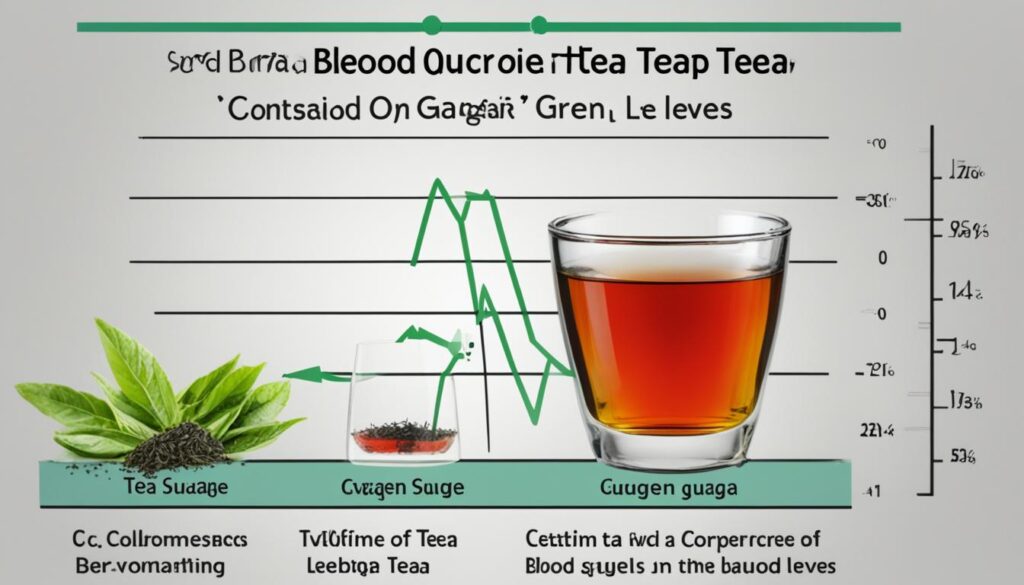More and more people are turning to natural wellness solutions. Among them, black tea stands out for its health perks. It is celebrated for its strong flavor and deep cultural roots. Also, studies show its potential in managing blood sugar, making it a great choice for those watching their glucose levels.
Black tea is enjoyed worldwide for its unique taste and health benefits, especially for blood sugar regulation. It’s made from the Camellia sinensis plant, which undergoes a special process that enriches it with polyphenols like theaflavins. These elements are known for helping keep blood sugar levels stable after eating, important for those with normal to pre-diabetic blood sugar.
Key Takeaways
- The oxidation of black tea leaves yields theaflavins; essential in glucose management
- Polyphenols in black tea contribute to its blood sugar control capabilities
- Regular consumption of black tea can support stable post-meal blood sugar levels
- Research underscores black tea’s potential in reducing type 2 diabetes risk
- Choosing black tea as a sugar-free alternative could be beneficial in health maintenance
- Black tea is the most consumed tea worldwide, doubling as a healthful beverage
Understanding Black Tea and Its Unique Properties
Black tea benefits, especially its impact on blood sugar, come from a special process called oxidation. This process not only gives black tea a unique taste and dark color. It also fills it with black tea properties for regulating blood sugar. These include theaflavins, which are key antioxidants found in black tea, making up 3% to 6% of its makeup.
Theaflavins go beyond adding flavor; they are powerful antioxidants. They play a big role in health, particularly in black tea effects on blood sugar levels. With black tea enjoyed worldwide, it’s important to understand the health benefits it may offer.
| Black Tea Component | Health Benefit |
|---|---|
| Theaflavins | Regulation of blood sugar and anti-inflammatory effects |
| Antioxidants | Heart health and cellular protection |
| Polyphenols | Enhanced focus and metabolic benefits |
| Flavor Profile | Increased sensory satisfaction without added calories |
Black tea stands out from green, oolong, or white teas because of its unique processing. This special method gives it unique health benefits, especially from its polyphenols. These benefits make black tea a top choice for people who care about their health. Black tea properties for regulating blood sugar make it an excellent daily drink for managing blood sugar levels.
“Black tea’s distinctive color, flavor, and health properties, which include managing blood sugar, are directly derived from its unique processing.” – Tea Connoisseur
- Potential to lower blood sugar spikes after meals
- Contribution to a reduced risk of type 2 diabetes
- Positive effect on insulin sensitivity and glucose metabolism
Black tea is the most loved tea in the world, thanks to its unique health benefits. Among these, the black tea effects on blood sugar levels are particularly noteworthy. They promise a natural way to help regulate blood sugar.

Black Tea and Blood Sugar Regulation
Exploring black tea shows an exciting link with blood sugar control. Its natural elements, like theaflavins and polyphenols, help manage blood sugar. These ingredients make black tea more than just a tasty drink. They also support our health.
The Role of Polyphenols and Theaflavins in Managing Blood Sugar
Black tea’s benefits for blood sugar come from theaflavins. These are special polyphenols found only in black tea. They help keep blood sugar levels in check, especially after eating sweets. This is great for those watching their glucose.
Learning about these polyphenols shows us how black tea can help balance blood sugar. Regularly drinking it can be a natural way to support blood sugar health.
How Black Tea Enhances Insulin Sensitivity
Black tea also plays a role in improving insulin sensitivity. If your body uses glucose better, you’re less likely to experience sugar spikes. This is crucial for diabetes prevention and management.
Improved insulin sensitivity means your cells can better absorb sugar. This takes some pressure off your pancreas.

Scientific Evidence on Black Tea and Glucose Management
Studies on black tea antioxidants and blood sugar control are promising. Research shows that drinking black tea can help maintain healthier blood sugar levels after meals. This highlights the antioxidant power of black tea in managing sugar intake.
| Indicator | Impact of Black Tea |
|---|---|
| Blood Glucose Levels | Reduced postprandial glucose levels |
| Insulin Sensitivity | Enhanced cellular response to insulin |
| Long-term Glucose Management | Improved glycemic control in pre-diabetic conditions |
| Antioxidants in Black Tea | Potent mechanism for blood sugar regulation |
Comparing Black Tea to Other Teas for Blood Sugar Control
Many people wonder how black tea helps with blood sugar levels. They compare it to popular teas like green, oolong, and dark teas. Each of these teas affects blood sugar differently. But black tea is unique because of the way it’s made. This process adds theaflavins to black tea, which are important for black tea and glucose management.

Research shows black tea is more than a warm drink. It can affect blood sugar in a good way. This makes it great for folks trying to avoid diabetes. Dark tea, which is similar to black, also helps control blood sugar.
Studies have found drinking black tea regularly can help you pee out more sugar. This means it can help keep blood sugar levels steady. This is key for people managing or avoiding diabetes.
- Habitual consumption of black tea associated with reduced insulin resistance
- Black tea’s unique theaflavins linked to potential benefits in glucose metabolism
- Observational studies suggesting a correlation between frequent tea consumption and improved blood sugar control
We need more studies to fully get black tea and glucose management. But what we know now is promising. Drinking black tea helps with blood sugar control better than some other drinks. Black tea is not just tasty – it’s a tradition that’s now backed by science. It might help fight diabetes, a big health issue globally.
The Impact of Black Tea Consumption on Diabetes Risk
Research shows black tea may lower the risk of diabetes. This makes it more than a simple comfort drink. Studies link regular black tea drinking to fewer cases of diabetes and prediabetes. It’s clear that black tea can help manage blood sugar levels and support good health.

Reduced Incidence of Diabetes and Prediabetes in Tea Drinkers
Drinking black tea every day might protect against diabetes. People who drink it are less likely to get the disease than non-drinkers. The tea’s abilities to help control blood sugar are key. It’s beneficial for those watching their blood sugar levels.
Black Tea Antioxidants and Their Effect on Insulin Resistance
The antioxidants in black tea help fight damage in the body. They also help lower insulin resistance. This is vital for using black tea to manage diabetes. It helps combat a primary cause of diabetes.
| Daily Tea Consumption | Reduced Risk of Diabetes | Reduced Risk of Prediabetes | Effect on Insulin Resistance |
|---|---|---|---|
| At least two cups | 28% less likely | 15% less likely | Significant reduction |
| Non-tea drinkers | No reduced risk | No reduced risk | No beneficial effect |
Black tea’s health benefits are impressive, especially for blood sugar control. By drinking it regularly, we use a natural way to fight diabetes and its complications. This offers an easy method to stronger health against diabetes.
Optimizing Black Tea Intake for Maximum Benefits
Black tea offers many health benefits, including help with black tea antioxidants and blood sugar control. To fully enjoy these benefits, it’s vital to think about not just what you drink, but how you drink it. Incorporating black tea into your diet the right way can help control blood sugar.
Appropriate Quantities of Black Tea for Health Benefits
Black tea is great for health, but too much of anything isn’t good. To get the best black tea effects on blood sugar levels, it’s important to watch your caffeine intake. Here’s how you can enjoy black tea every day:
| Black Tea Intake | Benefits |
|---|---|
| 1-2 cups | Gives a mild energy boost and antioxidant lift without too much caffeine. |
| 3-4 cups | This amount lets you enjoy all health benefits, including blood sugar maintenance. |
| 5-8 cups | Stay under the 400 mg caffeine limit to enjoy blood sugar benefits without overdoing it. |
Black Tea Preparation and Consumption Tips
Making and drinking black tea the right way can boost its health benefits. Follow these tips for the best brew:
- Choose loose-leaf tea: Loose-leaf tea gives you more black tea antioxidants than bagged tea.
- Avoid additives: Skipping milk or sugar keeps the tea’s natural blood sugar benefits.
- Optimal brewing time: Brew for three to five minutes for the best taste and benefits without bitterness.
By following these tips, you can better manage your blood sugar and enjoy black tea’s health benefits to the fullest.
Conclusion
The benefits of black tea are impressive, especially for blood sugar control. Black tea contains theaflavins and polyphenols that help. These substances work by making the body better at using insulin. This turns black tea from a simple drink into a key part of a diet focused on controlling sugar levels.
Studies show that black tea can lower the risk of diabetes and its problems. This shows the benefits of black tea for blood sugar regulation. Adding black tea to your diet is an easy way to improve your health. This is especially true for dealing with long-term conditions like diabetes.
Including black tea in a healthy lifestyle does more than just offer a great taste. It brings potential benefits against various health issues. Yet, drinking it in moderation and preparing it right matters a lot. This is the essence of tea drinking. When done with care, black tea isn’t just a soothing habit. It’s also good for you in the long run.



